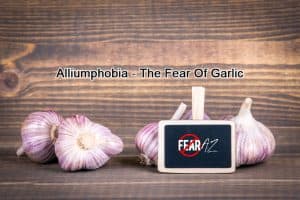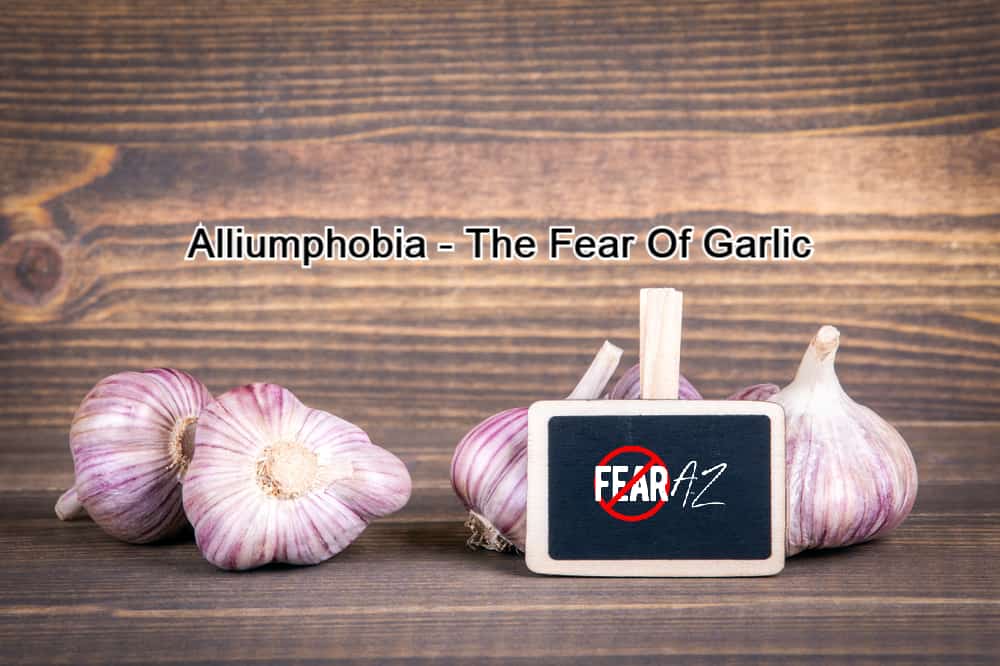Share This Article
Alliumphobia: Garlic Scares More than Just Vampires
Do you run away at the mere mention of the word “garlic”? Even when it’s just a tiny amount sprinkled on a pizza, does the scent send you running in the opposite direction?
Are you terrified of eating out for fear you might find a piece of garlic in your food? Do you turn down invitations to lunch and dinner at your friends’ or relatives’ homes so you can avoid any encounter with the sight, touch, smell, or taste of garlic?
If so, you may be an alliumphobe or someone suffering from alliumphobia, a kind of food phobia. In this case, it’s the phobia of garlic.
But don’t worry, you’re not alone. There are many different kinds of phobias, and around 12.5 percent of Americans have some form or other.
If you’re tired of hiding from garlic, read on to learn how you can kiss your fear of garlic goodbye.

What Is Alliumphobia
There are many types of food phobias, and alliumphobia is one of them.
Allium in Latin means garlic bulb, and phobia means fear. People suffering from this phobia get anxious at the mere thought or mention of garlic. They don’t even like the smell of garlic or any other pungent odor. So, onions, chives, and shallots are all out of the picture.
Alliumphobes will not touch food that they suspect has garlic as an ingredient. And this aversion is not about disgust—it’s real fear. The person may start shaking or sweating profusely. Severe cases, although rare, may cause panic attacks.
Imagine, as an alliumphobe, what it would be like to have a sibling or a parent who is a fan of garlic bread or garlic chicken. And while you’re at it, imagine an alliumphobe on April 19, National Garlic day.
And if living in fear of garlic isn’t enough, there is the additional fear of being mocked by those who don’t understand. So, it’s no surprise that people with alliumphobia try to hide their fear and feelings from friends and family.
Many with the fear of garlic think their only choice is to avoid the object of their fear. However, avoidance is a short-term solution that escalates one’s fear when faced with it.
If you’re following this tactic of avoidance, why not start taking steps to liberate yourself right now?
Alliumphobia Causes
Alliumphobia usually stems from a combination of several factors. While some people may be able to pinpoint the exact onset of the fear and what caused it, in other cases, such details may not be possible.
However, most phobias can be attributed to one or a combination of the following causes:
1. Genetic Predisposition
Genetics is the major reason behind chronic illness, including those involving mental health. Besides hypertension, depression, or a myriad of other illnesses, phobias are also linked to genetics.
This means if someone in your family has alliumphobia or any other phobia, the probability of you developing a phobia increases. However, it usually requires a trigger that will act as a switch for turning on the phobia.
2. Experience
Someone who was once trapped in an elevator may never travel by elevator again, or a person attacked by a dog may never go near one. Similarly, if someone had a traumatic event involving garlic, they may develop a fear of it.
At times, even hearing a recount of someone’s horror story can lead to the development of fear. So, a person who was mocked for having bad breath after eating garlic bread or who had choked on a garlic clove may start avoiding it. This can develop into a full-blown fear.
3. Learned Behavior
If a child at a young age looks up to a parent, friend, sibling, or neighbor who is averse to vegetable smells or garlic, for example, they too may learn the behavior and develop an aversion to it as well.
4. Literature, Media, and Facts
Garlic is associated with the vampire, a well-documented mythical character. So, it is no surprise that from a young age, kids are exposed to vampire stories and their association with garlic.
Many experts believe this could be a casual element that may later contribute to the development of a fear of garlic. Research hasn’t managed to substantiate this, though.
Alliumphobia Symptoms
A person who has alliumphobia will have physical symptoms observable to people around them, as well as psychological symptoms.
Physical Symptoms
- Loss of breath
- Dizziness
- Shaking
- Sweating
- Nausea
- Dry mouth
- Feeling faint
Physiological Symptoms
- Feeling of being detached
- Panic attack
- Fear of dying
- Anxiety
Alliumphobia Treatment
No two minds are the same when it comes to phobia, so there is no definitive treatment. The precise treatment plan can only be decided upon following professional analysis.
However, if you are in the initial stages, you may not need professional support and may be able to help yourself.
Self-Help
As it is said, self-help is the best help. You know yourself better than anyone else.
People with irrational phobias generally recognize that the subject does not pose any real threat and that it is all in their heads.
It is this principle that they need to work on and convince themselves that garlic cannot harm them. However, if you feel your case is only worsening, seek professional help.
Professional Help
There are many treatment options available for alliumphobia, and the doctor is the expert on deciding who will benefit from which treatment. Some therapies available are:
- Cognitive behavioral therapy (CBT)
- Systematic desensitization
- Exposure therapy
- Mindfulness-based stress reduction (MBSR)
- Neuro linguistic programming (NLP)
- Meditation
- Dialectical behavioral therapy (DBT)
- Energy psychology
- Hypnoanalysis
Medication
In extreme cases where self-help and therapy don’t work, the patient may have to be put on medication for a time. This is done concurrently with therapy, and the medication is gradually tapered off once the patient begins to benefit from therapy.
Anti-anxiety and antidepressants are the two classes of drugs that are usually prescribed for patients with anxiety disorders. They are only allowed with a prescription and must be discontinued as soon as possible following the guidance of your health care professional.
How to Cope with Alliumphobia
Alliumphobia, like other anxiety disorders, affects the normal day-to-day life of a person. It limits people from eating out and even socializing. The phobia may worsen to the point where sufferers isolate themselves and avoid social interaction.
Talk to your family and friends, and if you feel comfortable, join online groups to talk to people like you. These support groups not only assist you in overcoming your phobia but also offer advice on what to do next, the best doctors, and other tips.
Conclusion
Alliumphobia, or the fear of garlic, can be limiting, like many other phobias. With self-help and support from loved ones, you can free yourself from the fear. If that doesn’t help, approach professionals who understand what you’re going through and can expertly help you overcome your phobia.




